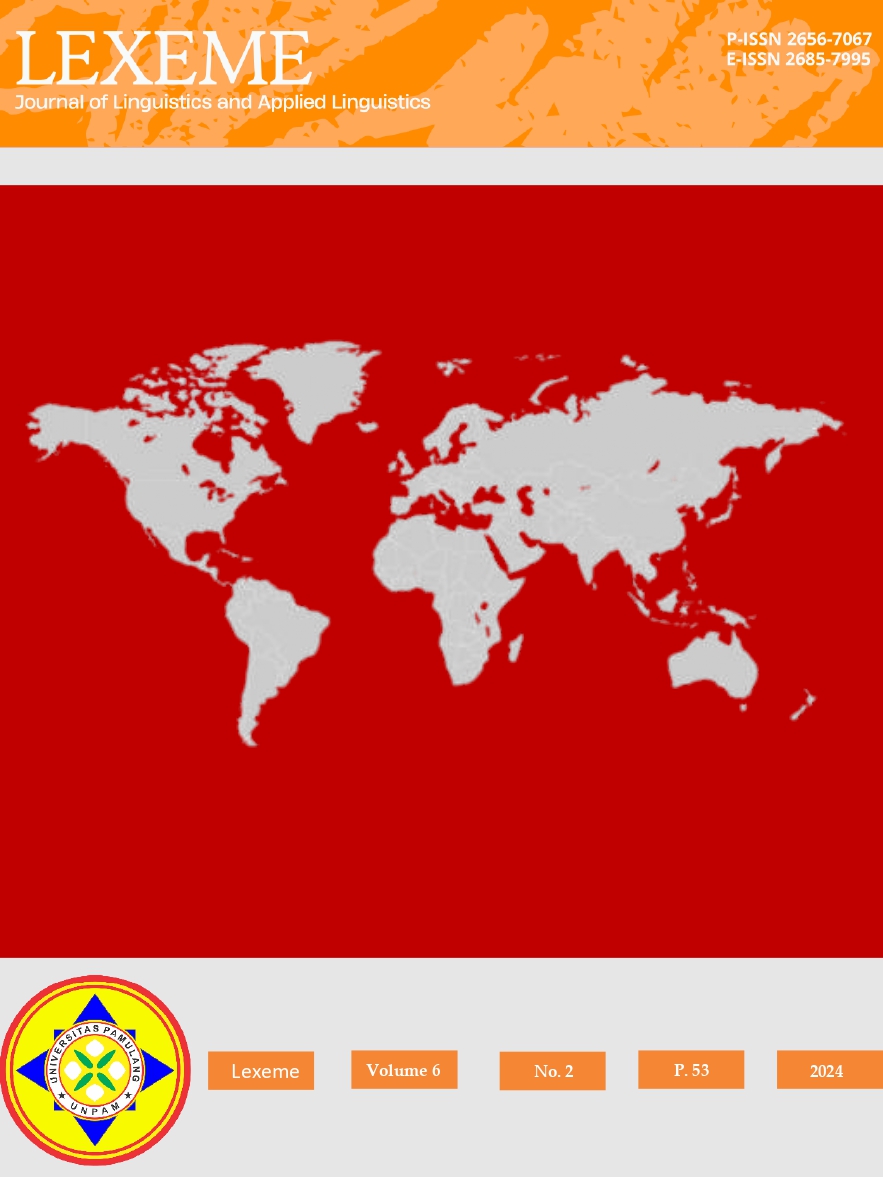Engagement to Excellence: Exploring the Correlation Between Student Participation and Writing Proficiency
DOI:
https://doi.org/10.32493/ljlal.v6i2.42857Keywords:
correlation research, engagement, writingAbstract
This research aims to explore the correlation between student engagement and writing proficiency among college students at the Sharia Faculty of UIN Raden Intan Lampung during the 2023/2024 academic year. The study employed a quantitative approach to assess the relationship between these two variables, with student engagement as the independent variable and writing proficiency as the dependent variable. The population for this study consisted of 450 students, from which a purposive sample of 40 students was selected. Data collection was conducted using a questionnaire to measure student engagement and a writing test to assess writing proficiency. The validity and reliability of the engagement data were analyzed using Pearson's bivariate correlation, and the writing test was validated by experts. Data analysis revealed a significant positive correlation between student engagement and writing skills, indicating that higher engagement levels contribute to better writing outcomes. These findings suggest that fostering student engagement can play a crucial role in improving writing proficiency. The study highlights the importance of incorporating engaging instructional strategies in the classroom to enhance students' writing abilities. However, the study's findings are limited by the sample size and scope, suggesting the need for further research across diverse educational contexts and writing genres.
References
Al-Obaydi, L. H., Shakki, F., Tawafak, R. M., Pikhart, M., & Ugla, R. L. (2023). What I know, what I want to know, what I learned: Activating EFL college students’ cognitive, behavioral, and emotional engagement through structured feedback in an online environment. Frontiers in Psychology, 13, 1083673. https://doi.org/10.3389/FPSYG.2022.1083673/BIBTEX
Andewi, W., Puastuti, D., & Hastomo, T. (2023). ELT blends: A case study of using Google classroom. AIP Conference Proceedings, 2621(1). https://doi.org/10.1063/5.0142458/2925802
Baron, R., & Baron, R. (2020). Studentsâ€TM Perception on Online Application in Speaking Skill e-Learning. VELES Voices of English Language Education Society, 4(2), 213–221. https://doi.org/10.29408/veles journal.v4i2.2543
Chi, M. T. H., & Wylie, R. (2014). The ICAP Framework: Linking cognitive engagement to active learning outcomes. Educational Psychologist , 49(4), 219–243. https://doi.org/10.1080/00461520.2014.965823
Hastomo, T., Mandasari, B., & Widiati, U. (2024). Scrutinizing Indonesian pre-service teachers’ technological knowledge in utilizing AI-powered tools. Journal of Education and Learning (EduLearn), 18(4), 1572–1581. https://doi.org/10.11591/edulearn.v18i4.21644
Hastomo, T., & Septiyana, L. (2022). The investigation of students’ engagement in online class during pandemic COVID-19. Jurnal Penelitian Ilmu Pendidikan, 15(2). https://doi.org/10.21831/JPIPFIP.V15I2.49512
Istiara, F., & Hastomo, T. (2023). Exploring lecturers and administrative staffs’ strategies to hone EFL students’ digital literacy. JOALL (Journal of Applied Linguistics and Literature), 8(1), 151–172. https://doi.org/10.33369/JOALL.V8I1.25568
Istiara, F., Hastomo, T., & Indriyanta, W. A. (2023). A study of students’ engagement and students’ speaking skill: A correlational research. TEKNOSASTIK, 21(1), 1–7. https://doi.org/10.33365/TS.V21I1.2198
Marzuki, Widiati, U., Rusdin, D., Darwin, & Indrawati, I. (2023). The impact of AI writing tools on the content and organization of students’ writing: EFL teachers’ perspective. Cogent Education, 10(2), 1–17. https://doi.org/10.1080/2331186X.2023.2236469
Metaria, M., & Cahyono, B. Y. (2024). EFL students’ engagement in the post-pandemic teaching: Does technology matter? Journal on English as a Foreign Language (JEFL) , 14(1), 26–47. https://doi.org/10.23971/jefl.v14i1.6503
Murcia, M. C. (2001). Teaching English as Second or Foreign Language Third Edition Maschuttes. New Burry House Publisher: Inc’Rowley.
Murillo-Zamorano, L. R., López Sánchez, J. Á., & Godoy-Caballero, A. L. (2019). How the flipped classroom affects knowledge, skills, and engagement in higher education: Effects on students’ satisfaction. Computers & Education, 141, 103608. https://doi.org/10.1016/J.COMPEDU.2019.103608
Nkomo, L. M., Daniel, B. K., & Butson, R. J. (2021). Synthesis of student engagement with digital technologies: a systematic review of the literature. International Journal of Educational Technology in Higher Education 2021 18:1, 18(1), 1–26. https://doi.org/10.1186/S41239-021-00270-1
Oktarin, I. B., & Hastomo, T. (2024). UTILIZING CRITICAL DISCOURSE ANALYSIS ON DEVELOPING STUDENTS’ DIGITAL LITERACY SKILLS: AN ACTION RESEARCH. Premise: Journal of English Education, 13(1), 90. https://doi.org/10.24127/pj.v13i1.8758
Qiao, S., Chu, S. K. W., & Yeung, S. S. sze. (2023). Understanding how gamification of English morphological analysis in a blended learning environment influences students’ engagement and reading comprehension. Computer Assisted Language Learning. https://doi.org/10.1080/09588221.2023.2230273
Sari, L. P., Hastomo, T., & Nurchurifiani, E. (2023). Assessing the Efficacy of Duolingo for Acquiring English Vocabulary Skills: Experimental Research. Journal of English Teaching Applied Linguistics and Literatures (JETALL), 6(2), 193–200.
Shah, R. K., & Barkas, L. A. (2018). Analysing the impact of e-learning technology on students’ engagement, attendance and performance. Research in Learning Technology, 26. https://doi.org/10.25304/RLT.V26.2070
Shchipitsina, L. Y. (2022). TECHNOLOGIES OF DEVELOPING VISUAL LITERACY AT UNIVERSITY FOREIGN LANGUAGE LESSONS. Philological Class, 27(4), 195–204. https://doi.org/10.51762/1FK-2022-27-04-17
Soffer, T., & Cohen, A. (2019). Students’ engagement characteristics predict success and completion of online courses. Journal of Computer Assisted Learning, 35(3), 378–389. https://doi.org/10.1111/JCAL.12340
Vaughan, N. (2014). Student Engagement and Blended Learning: Making the Assessment Connection. Education Sciences, 4(4), 247–264. https://doi.org/10.3390/educsci4040247
Yu, S., Jiang, L., & Zhou, N. (2020). Investigating what feedback practices contribute to students’ writing motivation and engagement in Chinese EFL context: A large scale study. Assessing Writing, 44, 100451. https://doi.org/10.1016/j.asw.2020.100451
Downloads
Published
How to Cite
Issue
Section
License
Copyright (c) 2024 Kartika S

This work is licensed under a Creative Commons Attribution-ShareAlike 4.0 International License.







